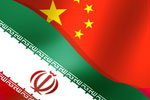 Wall Street Journal: A large Chinese state-owned company said it signed a $712 million dollar contract to help build a steel plant in Iran, signaling that Beijing isn’t ready to join Western nations in increasing pressure on Tehran over its nuclear program. The Wall Street Journal
Wall Street Journal: A large Chinese state-owned company said it signed a $712 million dollar contract to help build a steel plant in Iran, signaling that Beijing isn’t ready to join Western nations in increasing pressure on Tehran over its nuclear program. The Wall Street Journal
By CHUIN-WEI YAP
 BEIJING—A large Chinese state-owned company said it signed a $712 million dollar contract to help build a steel plant in Iran, signaling that Beijing isn’t ready to join Western nations in increasing pressure on Tehran over its nuclear program.
BEIJING—A large Chinese state-owned company said it signed a $712 million dollar contract to help build a steel plant in Iran, signaling that Beijing isn’t ready to join Western nations in increasing pressure on Tehran over its nuclear program.
A unit of state-owned metals giant China Nonferrous Metal Mining Group said in a statement Wednesday it will provide engineering design, equipment supply and installation, construction and training services for the Iran Butia steel plant.
China has consistently defended its economic ties with Iran, which is under U.S. and European Union sanctions for its alleged nuclear weapons program. Five months ago, China’s foreign ministry urged Washington to revoke sanctions it had imposed on Bank of Kunlun Co., a unit of China National Petroleum Corp., warning that they damaged China’s interests and Sino-U.S. relations.
China and Iran have normal, fair and transparent business relations in the areas of energy and trade, foreign ministry spokesman Qin Gang said at the time.
China Nonferrous’ Shenzhen-listed engineering and construction arm—China Nonferrous Metal Industry’s Foreign Engineering & Construction Co. 000758.SZ +1.20% —will handle the work. The latest deal adds to the company’s nearly decade-old history in Iran. When complete in four years’ time, the plant is expected to be able to produce 2 million metric tons of sponge iron and 1.5 million tons of steel billets a year.
China, like other big buyers of Iranian oil, has slashed its oil purchases from Iran, and in so doing has escaped threatened U.S. sanctions against importers of Iran’s oil introduced a year ago.
In the first 11 months of last year, customs data show the country imported an average 356,000 barrels a day of Iranian crude, down 22% from a year earlier, although the extent this was the result of U.S. pressure or a Sino-Iranian dispute over crude pricing, which disrupted shipments in the first few months of the year, is unclear.
A new test of China’s resolve to maintain its economic and political ties with Iran, and Washington’s readiness to confront Beijing, will come in May or June with the next six-monthly review of whether buyers of Iranian crude are continuing to reduce their shipments.
China Nonferrous’ unit has several other projects in Iran, mostly assisting Iranian companies building factories producing aluminum, alumina and ferroalloys. China Nonferrous didn’t respond to a call for comment Wednesday.
The deal is unlikely to be aimed at supplying China with Iranian steel. China’s steel sector suffers from overcapacity, and imports account for barely 2% of its total steel consumption.
However, Iran is a long-standing, albeit small-volume exporter of iron ore to China, trailing major suppliers Australia, Brazil, India and South Africa. China heavily depends on iron-ore shipments for steelmaking.
Though Tehran provided just 2% of China’s total ore imports, Beijing has long nurtured Iran among a slate of alternative suppliers to offset other exporters’ domination of the trade.
Despite a recent spat over Chinese commerce ministry accusations in December 2011 of fraud in Iranian iron-ore sales, China kept the volume of imports from the country unchanged at nearly 16 million tons last year.
The China Nonferrous deal might not trigger strong protests from the U.S. given the relatively small scale, and steel’s less strategic role compared with crude oil.
“Energy is a major revenue source for Iran, while metals account for relatively less, so I don’t think this will be as big of an issue,” said North Square Blue Oak analyst Frank Tang. “In any case, even against [the risk of] international sanctions, it’s not been the case that China always follows international decisions.”
The value of Iran’s crude sales to China in the first 11 months last year reached $15.7 billion, a sizable chunk of an overall $50 billion in bilateral trade, according to government data. Trade in iron ore in the same period was valued at near $1.7 billion.


